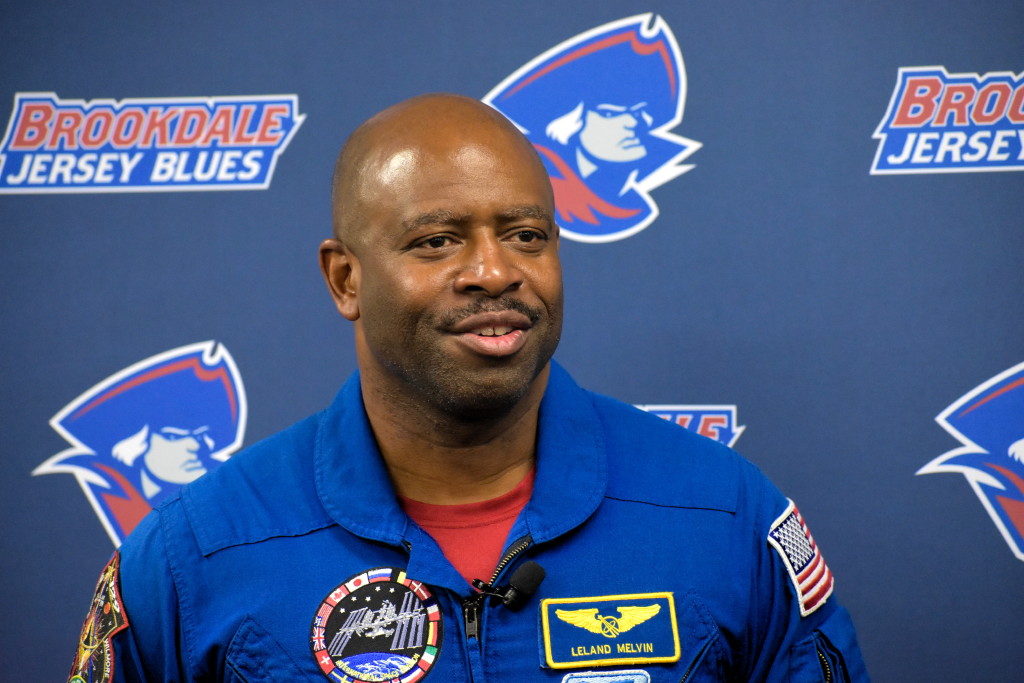The right stuff is the never-give-up-stuff.
That was the name of astronaut, scientist and author Leland Melvin’s memoir that was presented during Melvin’s recent appearance in the Collins Arena at Brookdale Community College in Lincroft.
On the evening of Feb. 28, Brookdale students and faculty members, and members of the public, came to learn about the former NFL draft pick’s 565 hours in space, as well as the unforeseen circumstances that launched Melvin’s career as an astronaut.
Melvin, who flew on Space Shuttle Atlantis in 2008 and 2009, is currently a NASA Associate Administrator for Education.
He said that before he ever lifted off into space, he faced hardships in defining life moments. Melvin said overcoming those hardships was a challenge he met with resilience and a little help from people who believed in him.
“As I went on my journey, I’ve had all these different obstacles,” he told those in attendance. “The right stuff is really the never-give-up-stuff and having the perseverance and the discipline to keep going when things go wrong. Throughout my journey, I always had people who had my back. All you need is one person.”
From a young age, Melvin said, his mind catered to curiosity. He said he was inspired by his father who re-purposed a bread truck and made the vehicle a livable space. Melvin said he was in awe of an explosion that occurred when he mixed incompatible elements from a toy chemistry set.
Melvin, 55, who is a native of Virginia, earned a football scholarship to the University of Richmond. He earned a Bachelor of Science degree in chemistry at Richmond and a Master of Science degree in materials science engineering at the University of Virginia.
Melvin, a wide receiver, was selected by the Detroit Lions in the 11th round of the 1986 NFL Draft. He injured a hamstring in training camp and was released. A year later, with the Dallas Cowboys, he sustained another hamstring injury and that ended his professional football career.
“I then did what every NFL player does, I went to work for NASA,” Melvin said. “I’m at NASA and working as a research scientist developing optical fibers …. my friend said, ‘Leland, you would be a great astronaut.’ ”
He applied the next year.
“I ended up going to Russia to work with a crew that was going to the International Space Station,” Melvin said. “It was the first crew that would inhabit the space station. I was there for two years helping (the astronauts) get ready for their mission. After we launched (the astronauts) into space, I flew back to Houston to start my training.”
Melvin explained what happened while he was training in the Neutral Buoyancy Laboratory.
“As I went down 20 feet into the pool, I turned up the volume in my headset,” he said. “From that point on I heard nothing but static and white noise. I was raised out of the pool and they popped my helmet off. The flight sergeant walked toward me moving his lips and I didn’t understand what was going on.”
He had, in fact, lost his hearing.
Four days before that incident, while Melvin was visiting his hometown, a stranger made him aware of a situation that would set the tone for his life moving forward.
“(This individual) said, ‘Something is going to happen to you. No one is going to know why it happened. You will be healed of this and you will find space. This will be your story you share with the world,’ ” he told the audience.
Melvin said doctors could not determine what had caused him to go deaf and told him he would “never find space.”
Daniel Goldin, who was the NASA administrator when the the Hubble space telescope was deployed in 1990, visited Melvin in the hospital and they communicated by writing notes.
Melvin said Goldin, who was blamed for the improper functioning of the space telescope, was shunned by the scientific community.
“We have this multi-billion dollar asset and it needed glasses,” Melvin said, noting that mirrors on the telescope were not fastened property and could not capture clear images of space.
Melvin said Goldin “did not give up on Hubble and he said he would not give up on me.”
Melvin said astronauts “wearing bulky gloves” eventually repaired the telescope. He said he was inspired by that accomplishment.
Melvin regained partial hearing several weeks later and was sent to Washington, D.C., to work in education. While there, he received a call from his boss who informed him of a tragedy.
On Feb. 1, 2003, the Space Shuttle Columbia, with a crew he had prepared for space, disintegrated upon re-entering Earth’s atmosphere. All seven crew members died.
“I knew all my friends were gone,” Melvin said, adding that he became more determined to find space, even though his hearing impairment disqualified him from flying on the shuttle.
Eventually, Melvin said, he received a waiver that permitted him to fly in space and he did so twice on the Space Shuttle Atlantis: once as a mission specialist and once as a mission specialist 1.
Melvin flew from Feb. 7-20, 2008 and helped to deliver and install the European Space Agency’s Columbus Laboratory at the International Space Station. He flew again from Nov. 16-29, 2009 and helped to deliver replacement parts for systems that provide power to the space station.
Today, Melvin has regained his full hearing.
“Throughout my journey, people have always told me I can do anything,” he told the audience at Brookdale.

